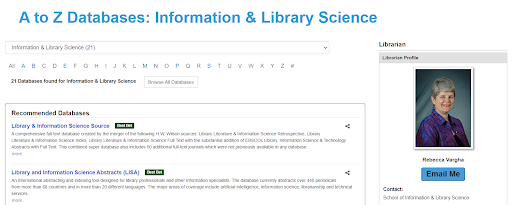Searching the Library Online
By Julian, a Writing Coach
Starting a new research project still has the power to intimidate me, even as a graduate student. With so much information available at my fingertips, how can I narrow down my results to find the resources I need?
When researching a term paper last semester, I developed a handful of favorite search strategies to use on the UNC Libraries website. When I began my search, the first question I asked myself was, “What kind of information am I looking for?”
To answer this question, I reread the assignment prompt, which asked for a focus on Information and Library Science (ILS) scholarly articles from roughly the last 20 years. I brainstormed until I came up with a specific topic: community archiving. Next, the prompt suggested searching subject databases. I also decided to focus on electronic (online-accessible) resources only, due to the current pandemic and general ease of access for me personally.
After making these decisions, I navigated to the UNC Libraries’ homepage, which presented me with this interface:
I could have used the general search box (“Search for articles, books & more”) if I wanted to cast a wide net for my search results. The general search box would result in broad search results from all types of library resources, gathering articles, books, databases, and more (even CD-ROMs), from all disciplines that mention my search terms. That could be helpful if I wanted to just get a lay of the land. However, since I already had a narrower starting point, and I knew that I would be writing within a specific discipline, I decided to bypass this search box and navigated to “E-Research by Discipline” in the lower leftmost blue box.
On the “E-Research by Discipline” page, I noticed a subject listing for “Information and Library Science” (ILS) underneath the Humanities and Social Sciences column. That link brought me to a list of suggested ILS databases to search.
At the top of that page, I saw two recommended databases for this subject area:
I decided to start searching the Library and Information Science Abstracts database. I used a couple of search strategies to limit the results. My initial keyword search was: “community archiv*”
The quotation marks around the two words mean that they will be searched next to each other in this exact order. The search will only bring up results for the exact phrase, but it would not, for example, find results from articles that mention “community” and “archiving” separately, but never together. Additionally, I used the second term archiv* (note the asterisk at the end). The asterisk is also functioning as a Boolean operator. This means that the search I performed includes all words that start with “archiv,” which include “archives,” “archive,” and “archiving”–these are common versions of the word “archives.” I wouldn’t want to miss a result just because it mentioned “community archiving” rather than “community archives.”
From there, I found 347 results. Using the left-column filter bars and checkboxes, I filtered the results to peer-reviewed and published in the past decade, which further narrowed my search to 177 results. This was a good starting place, but I was aware that there were still too many results. I wouldn’t be able to evaluate 177 articles before the due date, and even if I could, the amount of information would be beyond what I could cover within the assignment’s page limit. Instead, after skimming a few articles whose abstracts interested me, I decided to focus on regional archives in one specific country. I added another term to my search (“community archiv*” AND China) and ran it again. This limited my results and allowed me to go in-depth on an appropriately manageable topic, community archives in China, for the scope of my assignment.
The library also had plenty of resources to help me if I got stuck. On each E-Research page, a librarian’s contact information appears on the far right. For any questions about evaluating resources, expanding my search strategies, or citing my sources, I knew who to ask!
If I want additional assistance in exploring and locating library resources, I like to chat with or email a librarian. If I’m stuck on a writing project at any stage, I find that making an appointment at the Writing Center has helped me out, too!
This blog showcases the perspectives of UNC Chapel Hill community members learning and writing online. If you want to talk to a Writing and Learning Center coach about implementing strategies described in the blog, make an appointment with a writing coach, a peer tutor, or an academic coach today. Have an idea for a blog post about how you are learning and writing remotely? Contact us here.






